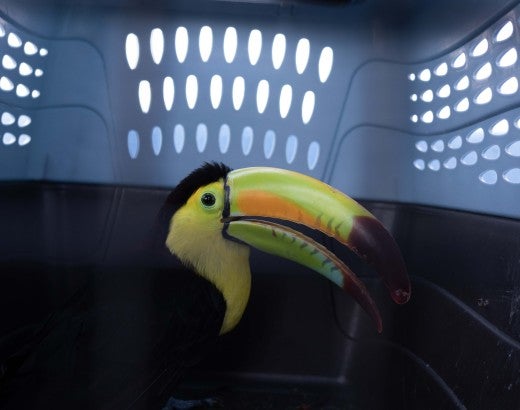It is a heartrending story, but with a happy ending for one elephant. Suman is born into captivity to Champa, one of dozens of elephants who are used to ferry tourists up and down the hills to Amer Fort, a popular spot in Jaipur, India. When Suman is still a calf, her overworked mother, to whom she is very close, falls severely ill and passes away.
Suman, stressed and agitated by her mother’s death, would have faced a life similar to her mother’s – as an elephant giving joy rides to tourists -- if not for the relentless efforts of Humane Society International and our partner in India, People for Animals. Last week, in response to a court case filed by HSI/India and PFA challenging the legality of Suman’s ownership, a court ruled that the 10-year-old elephant should be handed over to the state wildlife department. Suman is now being moved to a state-run rescue facility and we hope she will be soon moved to a sanctuary where she can spend the rest of her life in peace and in the company of other elephants.
Elephants in India are a beleaguered species and they face many threats, including habitat loss due to environmental degradation, human-animal conflict, poaching and the illegal wildlife trade, in which Suman was caught up. Studies show that the number of Asian elephants has dropped by at least 50 percent over the last three generations.
It is estimated that 3,500 elephants in India now live in captivity. India’s Wildlife Protection Act, passed in 1972, makes it illegal to capture elephants for commercial purposes, but people who already “owned” elephants at the time the law was passed were allowed to keep them so long as they obtained an ownership certificate. Unfortunately, like Suman, most of the elephants now in captivity are being held illegally and without the required papers.
The life of these captive elephants is one of neverending suffering, neglect and abuse: the gentle animals are usually captured as babies, tortured, beaten and their spirits broken so that they can be made to work. Elephants used in rides are disciplined using a sharp iron rod called an “ankush,” an instrument similar to a bullhook used by elephant trainers here.
The overworked elephants not only never receive medical treatment, but they are also denied adequate food and water. India’s animal welfare board uncovered animal cruelty and deplorable health conditions among many of the elephants used for rides at Amer Fort: many are over age 50 and their bodies are scarred from beatings and stabbing.
HSI/India is working to end this abuse, and the larger problem of wildlife trafficking in elephants in India. Last year, we helped end trade in wildlife, including elephant calves, at the massive Sonepur Fair in northeast India. And even as we celebrate the court victory for Suman, we are working to free other elephants used for the tourist rides at Amer Fort. We have filed animal cruelty cases against the owners of 103 elephants, and we have filed a writ petition in court challenging those who are keeping elephants illegally and using them for the rides.
Among the elephants we are hoping to remove from a life of abuse is a baby elephant, also named Suman, who has been making news with her own sad story of being separated from her mother and being kept in captivity.
With our court cases, and through a media and public awareness campaign, we hope to create enough momentum to end the use of elephants at Amer Fort and pressure the state’s government to outlaw the use of elephants for rides. Our ultimate goal is to get all of these animals out of this life of misery so they can live out the rest of their lives in peace.



